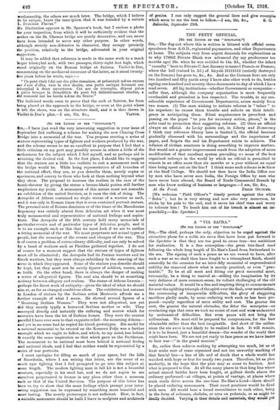THE PETTY OFFICIAL
[To THE EDITOR OP THE "SPECTATOR.'
Sm,—The dug-out where this is written is littered with official corre- spondence from A.O.D., regimental paymasters, and other Departments at home. The subjects vary from urgent demands for explanations as to why 179862 Private Blank was advanced (by my predecessor ten months ago) 16s. when he was entitled to 14s. 9d., whether the infant " casualty " born to Private C. last January is named Francis or Frances, where the bell (valued Is. 3d.) of bicycle 21111112 (entirely destroyed on the Somme) has gone to, he., ho. And as the Gorman lines are only two hundred and fifty yards away I have also other work to do, besides signing one hundred and seventy-three documents to-day of which I have read seven. All big institutions—whether Government or companies— suffer thus, although the company organization is more frequently overhauled and precedent is less respected. The trouble, in my con- siderable experience of Government Departments, arises mainly from two causes. (1) The man wishing to initiate reforms is " taboo " to his superiors: he causes them trouble and reflects on their intelli- gence in anticipating them. Silent acquiescence in precedent and passing on the paper "to you for necessary action, please," is the safer road to promotion than suggesting reforms. (2) Once an official always an official As Leaky points out, in Liberty and Damocracy I think (my reference library hero is limited !), the official becomes gradually obssessod with his surroundings and the importance of paper, and forgets the end his Department exists to achieve. The infusion of civilian amateurs is doing something to improve matters. But would not a greater improvement result from the adoption of some modification of that excellent system prevailing on some of the best organized railways in the world by which no official is permitted to remain in an office more than six months or a year without an equal time being spent out on the line ? I think some such scheme is in force at the Staff College. We should not then have the India Office run by men who have never soon India, the Foreign Office by men who have never been abroad, the Board of Trade Commercial Branch by men who know nothing of business or languagos.—I am, Sir, he., [We welcome "Field Officer's" timely protest against the white " Babu " ; but he is very strong and now also very numerous, he sticks by his pals to the end, and it saves his chief time and worry to tolerate him! To bomb him out of his trench is almost an im- possibility.—En. Spectator.]


































 Previous page
Previous page